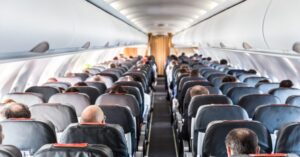
A recent airborne incident has ignited a fiery debate about the unwritten rules of airline etiquette and the moral obligations of travelers when it comes to seat arrangements. The focal point of this controversy? A 23-year-old seasoned flyer who steadfastly declined to swap seats with a 10-year-old boy, consigning him to the solitude of economy class while his parents luxuriated in first-class opulence. This incident has raised profound questions about compassion, societal norms, and the ever-shifting dynamics of air travel.
This intriguing tale came to light when an anonymous passenger took to the platform of Reddit to narrate her unique experience. She revealed that she and the parents of the young boy had been bestowed with the privilege of first-class travel, leaving their child behind in the humbler economy section. Rather than acceding to the child’s request for a swap, the passenger opted to remain ensconced in first class, triggering a vehement backlash from both the online community and the wider public.
The incident serves as a poignant illustration of the simmering tensions that can surface during air travel, where the desire for comfort and convenience occasionally collides head-on with one’s responsibilities towards fellow travelers. The parents, who had willingly seized the opportunity for a first-class upgrade, unintentionally left their offspring to brave the flight alone in the economy compartment. While the passenger’s choice to retain her coveted seat may appear heartless to some, it underscores the intricate nature of individual decisions and the absence of well-defined guidelines for such scenarios.
This occurrence is not the sole catalyst for a spirited conversation around in-flight decorum. Just days before, a pharmacist made headlines for her refusal to vacate her seat, preventing a mother and her teenage child from sitting together. Both incidents cast a glaring spotlight on the labyrinthine social dynamics of air travel, where limited space, varying degrees of comfort, and personal inclinations often trigger conflicts.
The anonymous passenger’s Reddit post, intriguingly titled “Am I the A**hole,” set the stage for a spirited discourse, as users weighed in on the ethics of her decision. Many contended that the onus of responsibility rested squarely on the boy’s parents for opting to upgrade and leaving their child in the lurch. On the flip side, others censured the passenger for her perceived lack of empathy, asserting that simple human decency should prevail in such situations.
This incident lays bare the evolving norms and expectations that pervade the realm of air travel. In a bygone era, first-class cabins were an exclusive domain reserved for the elite, but today’s travel landscape is a diverse tapestry, with passengers from all walks of life sharing the same airspace. This diversity ushers in a multitude of perspectives and expectations, further complicating the already intricate web of social interactions onboard an aircraft.
Ultimately, this incident beckons us to contemplate broader questions concerning personal responsibility, empathy, and the role airlines play in mediating such occurrences. While airlines typically do not dictate passenger seating, this incident underscores the necessity for clearer guidelines and enhanced passenger education to avert similar incidents in the future.
As the world of air travel continues its evolution, the challenges of coexisting within the confines of a metal tube hurtling through the sky alongside strangers will persist. The incident involving the 10-year-old boy and the passenger’s unwavering stance on her seat serves as a stark reminder of the intricate dance that unfolds when individual desires clash with societal expectations. It serves as a testament to the reality that, in today’s world, the skies are not just filled with airplanes but also with a rich tapestry of human narratives, choices, and interactions that collectively shape the journey for all those aboard.





